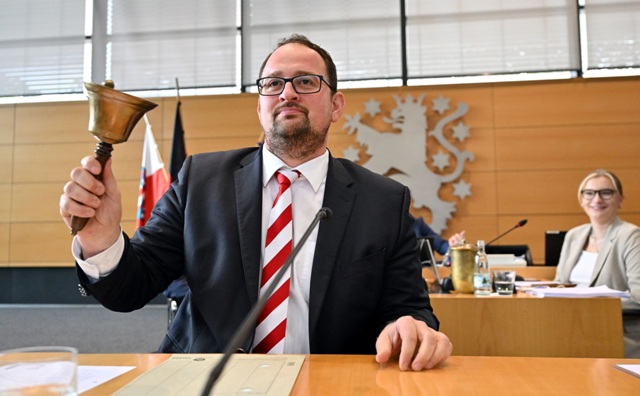Far right AfD denied as lawmakers pick leader for Thuringia

By Simone Rothe and Stefan Hantzschmann, dpa
THURINGIA – Lawmakers in the central German state of Thuringia reconvened on Saturday amid a chaotic deadlock between the far-right Alternative for Germany (AfD) and other parties.
The AfD made historic gains in September 1 regional elections in Thuringia, claiming more than a third of all seats. But every other party has refused to cooperate with the AfD and vowed to keep the far right frozen out of power.
After a series of procedural moves on Saturday, lawmakers elected Thadäus König from the centre-right Christian Democrats (CDU) as the new president of Thuringia’s parliament. König easily defeated the AfD’s nominee, Wiebke Muhsal.
An initial session for the state parliament on Thursday ended in bickering, after the presiding AfD refused to allow the CDU to amend parliamentary rules or nominate a candidate for the post.
The largest party in the body, in this case the AfD, normally has the prerogative of nominating candidates. But every other party had already vowed to block AfD politicians.
The CDU, which finished second in the September 1 election, is expected to take on leadership in the state because the AfD remains isolated and without potential coalition partners.
The parliamentary president runs administration of the body and also holds the power to call lawmakers into session at any time. In the absence of a president, the oldest lawmaker in the body – the 73-year-old AfD politician Jürgen Treutler – has been acting in that role.
The courts sided with the CDU in a hastily filed lawsuit, ruling that Treutler must bring rule changes to a vote, clearing the way for the CDU to put forward König.
The CDU is also locked in difficult negotiations to form a coalition government in Thuringia. That task has been made more difficult by the CDU’s refusal to work with the hard-left Die Linke (The Left) in addition to the AfD.
Together, Die Linke and the AfD hold half of the 88 seats in the state parliament, making it impossible to build the necessary majority without the cooperation of at least one of the parties.
Meanwhile, conservative opposition leader Friedrich Merz has said that ractured politics and the rise of populist parties means Germany’s democracy is facing its “toughest test in recent decades.
Merz, the leader of the centre-right Christian Democrats (CDU), referred to a chaotic political stalemate in the central German state of Thuringia, where the far-right Alternative for Germany (AfD) made breakthrough gains in a September 1 election and took more than a third of seats in the state parliament.
In Thuringia, the CDU is now struggling to put together a governing majority in the deeply divided parliament with other parties, including the upstart populist Sahra Wagenknecht Alliance (BSW).
Gridlock in Thuringia is “just a small foretaste” of what could come elsewhere in Germany in the near future, Merz told fellow party members at a gathering in the western German city of Münster.
Merz appealed to the centre-left Social Democrats (SPD), the Greens and the pro-business liberal Free Democrats (FDP) to defend democracy during next year’s national elections even as each party campaigns hard.
Despite deep political differences, the parties must show “that cooperation, collaboration and standing together are possible in the broad democratic centre of our country,” Merz said.
“We will not let these people destroy our democracy in Germany,” Merz said.

